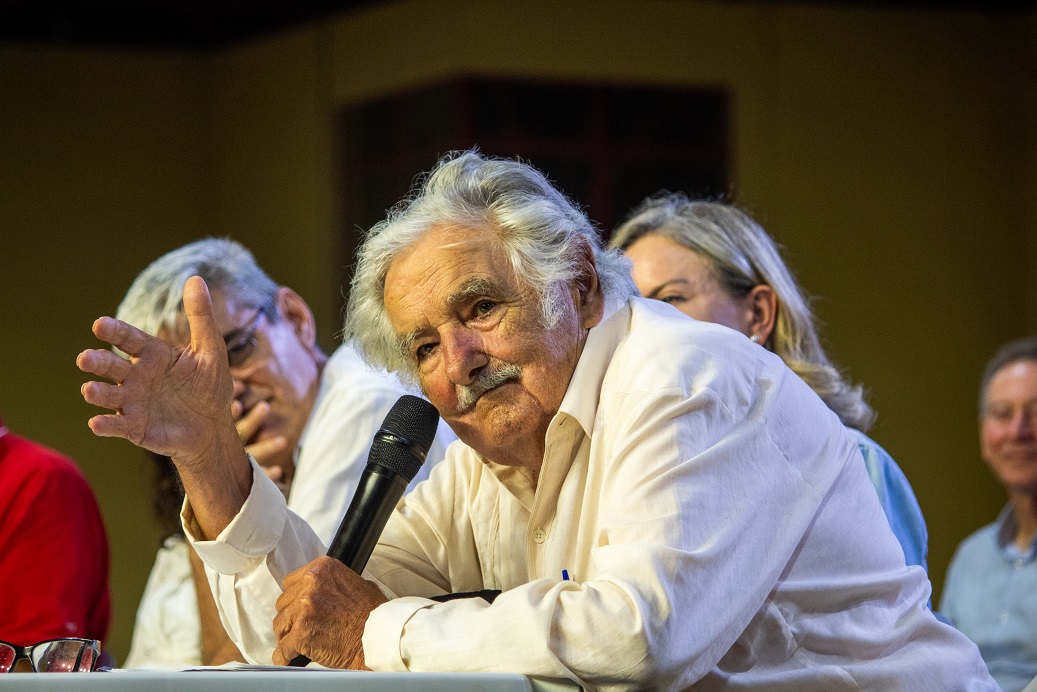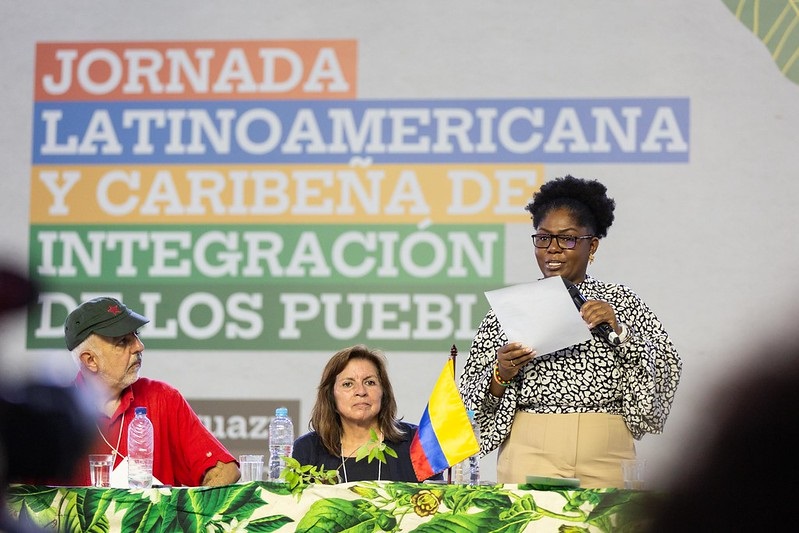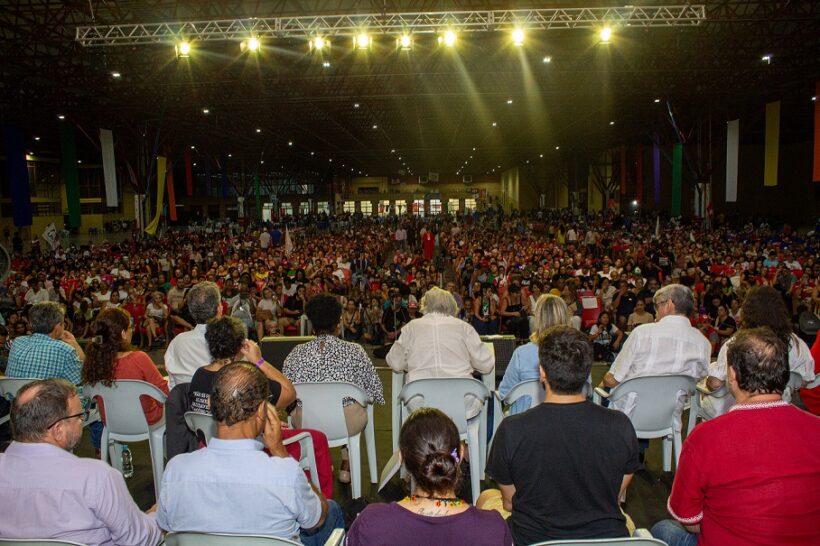It was a tearful experience to share with thousands of comrades the intense days of the Day of Peoples’ Integration in Foz do Iguaçu, a milestone that, from its conception, has had the objective and responsibility of transcending the transience of an event.
It is also part of a long process of resistance and struggle against colonialism, military dictatorships, and the neoliberal wave that has successively hit the inhabitants of these lands.
For this reason, beyond the chronicle, it is necessary to rescue and reflect on the distillation of some of the concepts expressed, continuing the essential debate which, as has been said, will hopefully take root in the popular soul.
From emotion to reflection
There is no integration without the people to sustain it, said former Uruguayan President José “Pepe” Mujica, setting a clear course for efforts to build a common home in Latin America and the Caribbean.
 Photo: Juliana Barbosa (MST-PR)
Photo: Juliana Barbosa (MST-PR)
The concept, which is extremely instructive for those who continue to look only at the cupular armament of a purely inter-state political model of integration, is not new – just as the drive for integration is not new, as the veteran Uruguayan fighter also pointed out – but yes, it is imperative.
In our opinion, the reorientation of integration efforts with a view to popular support has to do with understanding one of the factors underlying the recent revolutionary advances of the extreme right: the legitimate popular dislike of the bureaucratized political system because of its alienation from the social base.
This gap is exploited and reinforced by the media, which are part of the network of concentrated capital, to amplify errors, but above all to create parallel realities that distance the majorities from transformative social and political activity and lull them into dreams and consumer dependencies.
When this phenomenon is projected onto a regional scale, integration, which is merely institutionalized between governments, far from acting as a factor of rapprochement between peoples, ends up as an entelechy of acronyms and regulations that are utterly incomprehensible and distant. This alienation can only culminate in popular rejection.
It should be added that this rejection is fully justified when integration is centralized and used by corporations to defend their interests or to pursue aggressive geopolitical agendas that are far removed from the general interest.
Just look at the current example of the European Union and the ongoing rebellion of its workers and peasants, whose protest, diverted from its best objectives by fanatical personalities, ends up feeding the mill of fascism.
In this way, regional integration “with the people” should correspond to political practices that place at their center a real and not a declarative popular protagonism, not limited to the leaders or vanguard sectors. This implies the need for a radical reform of how society is organized and decisions are taken, tending towards a progressive decentralization of power, as has been demanded, with its characteristic nuances, by Hugo Chávez’s Bolivarian call (commune or nothing!), by Zapatismo, with its caracoles de Buen Gobierno, and even by the defense of federalism and/or municipalism, to name but a few examples, which are today important and surprising factors of resistance in Argentina against the disintegrating onslaught of the national government.
The people as protagonists
In his intervention in the final act of the Foz conference, Mujica gave interesting examples of teaching the necessity and usefulness of integration to improve the deplorable situation of the group we usually call “the people”, although many of its members, perhaps influenced by false individualistic promises, do not always see themselves as such.
Mujica called for a first stage with possible topics that are difficult to condemn and that could facilitate the understanding at the social level of the advantages and the need for survival that continental integration implies.
Integration is not an end in itself and will not be successful if it does not improve people’s lives. Moreover, in order not to be an empty signifier, a useless slogan, it must be configured with precise images, it must acquire color, shape, plasticity, arouse passion… The former Uruguayan president referred to all this somehow, even alluding to a flag and an anthem.
Without going into these valuable and practical suggestions, this reorientation of politics and integration in Latin America and the Caribbean presents us with important dilemmas that we cannot avoid if we want to go beyond rhetoric and demagogy.
Aristotle, in his definition of demagogy, warned of the danger of “flattering the people”, and the romanticization of the masses, so typical of fascism and authoritarianism, could be inimical to the effective liberation of the collective subject.
People are not uniform, neither in their living conditions, nor their cultural formation landscapes, not in their generational memories, not in their internal motivations, so to ascribe to them a single intentionality based only on a place of belonging could be a strategic error.
The basis for unity
Beyond diversity and differences, however, indignation and the need to accumulate social and political strength in the face of humiliation sometimes bring people together. And when the flame of a common project ignites the hearts of groups with fervor, no barrier can stop it.
These projects are based on values that are not as visible as immediate demands, but which in the long run give sustainability, coherence, depth, and effectiveness to revolutionary action.
Values which, on the one hand, are linked to elements present in the historical memory of each people, but which, by definition, to be revolutionary, must bring in new elements which do not necessarily coincide with traditional practices or values.
The current Vice-President of Colombia, Francia Márquez Mina, undoubtedly referred to these elements to be transformed in her speeches during the conference. She repeatedly and vehemently called for the overcoming of patriarchy and racism in society and in the ranks of those who promote integration for a better world to be taken very seriously.
 Photo: UNILA
Photo: UNILA
Also, very present in the spirit of the conference was the conviction that we need to go far beyond anything that hinders the convergence of diversity and the sum of the forces to which we aspire. To this end, it is worth looking in the mirror at the divisions caused by personalism, the fierce internal struggles for organizational control, the way dissent is dealt with, and the tendency to impose the identities and organic slogans of each collective on the others.
As MST activist Messilene Gorete, a member of the meeting’s coordinating team, pointed out with wisdom and experience: “We are here because of what unites us.
And what is it that unites us, that can act as welding, a permanent element of fusion, amid the pressure of discourses that tend towards dispersion, fragmentation, and divergence? Is it enough to reject imperialism and its tricks? Is it enough to condemn the obscene accumulation of capital in the hands of a few, while millions of people suffer poverty? Is it enough to condemn the capitalist system and to show solidarity with all those who suffer from violence, discrimination, and exclusion in its various forms?
All this is essential to clarify the direction, but more is needed to forge the powerful utopia that will create the future.
Let us ask ourselves once again: what can be the value that unites people, that integrates people beyond all differences, to guide us and lead us to a different reality?
What we essentially have in common, what makes us part of a community, what unites us, defines us, moves us, and calls us, is the humanity present in each one of us.
So, if we could go beyond an inherited identity or place of birth, if we could accompany our daily efforts to confront the negative forces of the system to value the humanity in those around us if we could also raise people’s awareness of the possibility of adhering to this broad humanism, this would be a great step towards unity and integration and a new and different world. Not only from below but also from within










